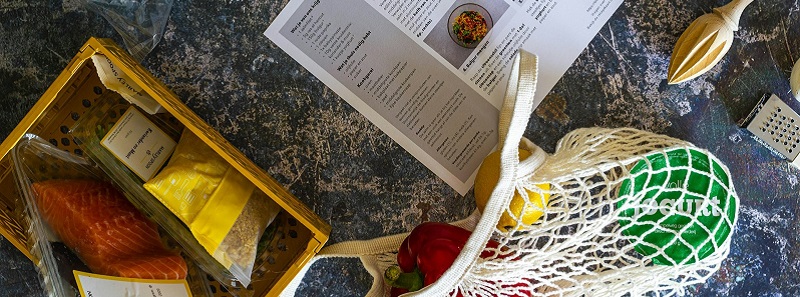
Exploring the impact of recipe-boxes on dietary quality and food agency: a pilot RCT in households with school-aged children in Birmingham
The problem
In the UK, diets are unhealthy. They are high in nutrients like sugar, salt, and saturated fat, and in ultra-processed foods (UPFs). Preparing food at home is often associated with a higher quality diet. However, preparing food at home requires skills, time, and energy.
We hypothesise that a recipe-box subscription may help households with children to prepare healthy meals at home more conveniently and affordably. Recipe-boxes may also lead to other benefits. For example, recipe-boxes may improve one’s food and cooking skills, capability to make food that one values, and quality of life. For households with children, recipe-boxes may also help children learn how to cook or appreciate a wider range of healthy dishes.
The intervention
This intervention involves participants taking part in a recipe-box subscription (2 to 4 recipes per week) for 8 weeks with a discount of 40%. If participants choose, they may continue for another 12 weeks with a discount of 15%. Participants choose their order online from around 100 meals. Each box contains pre-portioned ingredients to prepare a meal, together with simple instructions.
Setting
Households with children of school age in Birmingham.
Inclusion criteria:
- Having at least one child attending primary or secondary school in the household
- Having access to cooking rings, an oven, and a fridge at home (needed to prepare Gousto’s recipes).
- Confirmed willingness to complete the trial if randomised to either group.
Exclusion criteria:
- More than five household members.
- Have used recipe-boxes in the previous 3 months.
- The main food provider (who will complete the surveys) who cannot read, write, and speak in English.
- Not having access to internet and a digital device (smartphone, tablet, or laptop).
- Any member of the household having recently participated (past 3 months), currently participating, or scheduled to participate, in another diet-related trial, cohort, or clinical study.
- Planning to be away from their home address for more than one week during the 8 week initial trial period, or anytime during baseline or 8-week assessment points.
The research
Primary research question
Does a recipe box subscription lead to a healthier dietary pattern, and if so for whom?
Theory of change
Research Questions
Primary objectives and outcome measures:
- How acceptable are the recruitment strategy and enrolment procedures, from sample size attained?
- How acceptable is the recipe-box subscription at the discounted rate, from retention rate at eight weeks?
- How acceptable is allocation to the waitlist control, from retention rate at eight weeks?
- What is the sample size needed for the main trial to detect an average treatment effect in the primary outcome in the main trial (dietary quality) with α of 0.05 and power of 0.90?
Qualitative outcomes include:
- What are the perceived benefits of the recipe-box subscription and barriers to participation?
- Are hypothesised mediators in the TOC observed, and do they lead to longer-term benefits (e.g. independently planning and preparing meals)?
- Do recipe boxes affect participants’ food agency?
Feasibility outcomes include:
- How feasible are the recruitment strategy and enrolment procedures?
- What is the level of adherence to allocation: for the intervention group, ordering two to four recipe-boxes weekly; for the waitlist control group, not obtaining recipe-boxes from any sources?
Research approach
We will conduct a parallel-group and unblinded pilot and feasibility randomised controlled trial with a waitlist for the control group. Households will be randomised in a 1:1 allocation.
A market research company under a service agreement with the University of Cambridge will conduct stratified random sampling within wards of Birmingham. The market research company will provide a Participant Information Sheet, verbally screen for eligibility using an eligibility questionnaire, and collect data on the primary food providers’ ethnicity, gender, and age, to ensure quotas are filled. We aim to recruit n = 150 participants (n = 75 per group).
Key outcomes for the pilot trial will be the acceptability of the recruitment strategy, enrolment procedures, recipe-box subscription, and waitlist control group for participants.
We will also examine the feasibility of the recruitment strategy and enrolment procedures, and to what extent participants adhere to their group allocation.
Qualitatively, we will examine the perceived benefits of the recipe-box subscription, and barriers to participation, and whether mediators in our theory of change are observed. We will also explore whether and how the recipe-box subscription affected participants’ food agency—that is, their capability to prepare food that they value.
Research Partners
This trial is part of the SALIENT Food Trials, a collaboration between eight universities (Oxford, Cambridge, Warwick, Birmingham, Hertfordshire, Liverpool, London School of Hygiene and Tropical Medicine, and Queen Mary University of London) and two research institutes (Nesta and the Behavioural Insights Team).
Outputs and impacts
Planned publications in peer reviewed journals. Separate publications for 1) quantitative outcomes, acceptability, and feasibility, and 2) qualitative analyses of the effects of recipe-boxes on participants’ food agency.
Participant information
Research Team
- Prof Martin White | MRC Epidemiology Unit, University of Cambridge
- Noah Cooke | MRC Epidemiology Unit, University of Cambridge
- Dr Jean Adams | MRC Epidemiology Unit, University of Cambridge
- Prof Emma Frew | Institute of Applied Health Research, University of Birmingham
- Prof Jaideep Prabhu | Judge Business School, University of Cambridge
- Dr Thomas Ball | Department of Zoology, University of Cambridge
Funding
We are funded by the Economic and Social Research Council (ESRC)’s SALIENT Food Trials Grant [ES/Y00311X/1].
Sponsor
The study will be sponsored by the University of Cambridge (G122382).
Ethics
This trial has ethics approval [Rec.HSSREC 24.374] from the Humanities and Social Sciences Research Ethics Committee at the University of Cambridge.

 MRC Epidemiology Unit
MRC Epidemiology Unit